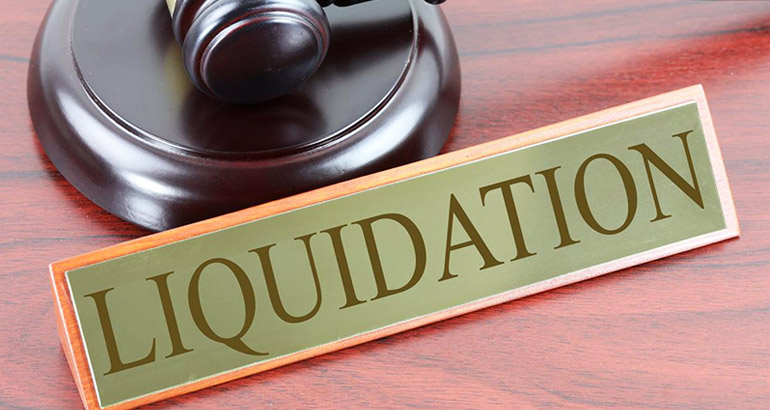Company Liquidation - Truths
Company Liquidation - Truths
Blog Article
Company Liquidation Can Be Fun For Anyone
Table of ContentsThe Only Guide for Company LiquidationSome Of Company Liquidation10 Simple Techniques For Company LiquidationThe Best Strategy To Use For Company LiquidationCompany Liquidation Things To Know Before You Get This
A liquidator is particularly appointed to supervise the winding up of a business's affairs in order for it to be closed down commonly when the firm is declaring bankruptcy. The liquidator is an impartial third party that looks after the sale of company properties in order to repay any type of arrearages.Their function consists of, yet is not restricted to: Objective Movie director: A liquidator is charged with serving as a neutral 3rd event to look after the whole company liquidation process. Produce Statement of Matters: Liquidators must develop a thorough statement of events record. This file is dispersed to lenders, detailing the existing economic standing of business at the time of its liquidation.
After the liquidation of a company, its presence is eliminated from Companies Residence and it stops to be a legal entity. If supervisors navigated the procedure without problem, there would be no fines or personal responsibility for solid financial obligations anticipated. Now, with a fresh start, supervisors can explore brand-new business chances, though expert appointment is suggested.
The Definitive Guide for Company Liquidation
If even more than 90% of all firm shareholders agree, liquidation can take location on short notice within seven days, the minimal legal notification for creditors. Nevertheless, normally, the larger the liquidation and the more possessions and resources business has, the longer the process will take. 'Do I have to pay to liquidate my company?', the answer will depend on whether or not your organization has any assets leftover when selling off.

We comprehend that no 2 firms are the very same, which is why we will certainly put in the time to obtain to understand your business so we can recommend the ideal training course of activity for you. We only work in your best rate of interests, so you can be entirely certain in the service we offer.
Some Known Factual Statements About Company Liquidation
In the UK, there is a set procedure to shutting down or restructuring a limited firm, whether it is solvent or financially troubled. This process is understood as liquidation and can only be managed by a certified bankruptcy specialist (IP) based on the Insolvency Act 1986. There are 4 get redirected here main kinds of company liquidation process: Lenders' Voluntary Liquidation (CVL); Obligatory liquidation; Administration; and Members' Volunteer Liquidation (MVL).

In these conditions, it is very important that the company discontinues trading; if the company proceeds to trade, the directors can be held personally liable and it might result in the bankruptcy practitioner reporting wrongful trading, called misfeasance, which may bring about lawful action. The supervisors appoint a bankruptcy specialist and as soon as this has actually been agreed and validated, there is a meeting with the investors.
The directors are no longer involved in what happens, including the sale of the company's assets. If the directors want any of the assets, they can notify the IP.
What Does Company Liquidation Do?
The primary difference is that the firm's financial institutions used to the court for a winding up order which requires the insolvent firm right into a liquidation process. In most instances, financial institutions take this action as a last resort due to the fact that they have not received settlement with other kinds of arrangement. The court appoints a bankruptcy professional, also known as a main receiver, to conduct the required business liquidation procedure.
This sort of firm liquidation is not voluntary and supervisors' conduct is reported to the UK's Secretary of State once the liquidation procedure has been finished. Any type of director that falls short to work together with the IP or has actually been entailed in director misbehavior, or a fraudulent act, may result in serious repercussions.
It is used as a method additional info to shield the company from any type of lawsuit by its lenders. The supervisors of the firm accept make routine repayments to resolve their financial debts over an amount of time. The selected manager handles the voluntary administration procedure, and receives the repayments which they after that disperse to financial institutions according to the agreed helpful site amounts.
4 Easy Facts About Company Liquidation Explained
This supplies the business with time to develop a plan moving forward to rescue the company and avoid liquidation. At this point, directors hand control of the firm over to the assigned administrator. If a company is solvent but the supervisors and investors wish to close the business, a Members Volunteer Liquidation is the right choice.
The business liquidation procedure is handled by a liquidator appointed by the supervisors and shareholders of the company and they have to sign an affirmation that there are no lenders remaining. The liquidation procedure for an MVL resembles that of a CVL in that properties are understood yet the proceeds are dispersed to the directors and the investors of the business after the liquidator's costs have been paid.
Report this page